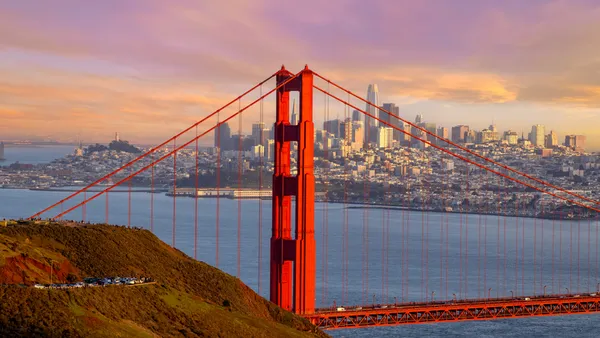Dive Brief:
- The global business travel industry has recovered more quickly than previously expected, according to the Global Business Travel Association’s 2023 annual global report, unveiled this week at GBTA’s annual convention in Dallas.
- The report found that in 2022, global business travel spending rose 47% year over year to $1.03 trillion, $395 billion of which went toward lodging costs, the highest number out of any category, which also included air travel, food and beverage, ground transportation and miscellaneous expenses.
- While hotels have benefited from strong leisure travel demand following a pandemic slump, group and business travel has been slower to recover. GBTA expects global business travel will return to its pre-pandemic total of $1.4 trillion in 2024 and grow to nearly $1.8 trillion by the end of 2027.
Dive Insight:
GBTA has moved its timeline for projected business travel recovery up two years, “as more favorable economic conditions in 2022 and 2023 have lifted the baseline of our expectations moving forward,” the report reads.
As part of the report, GBTA surveyed business travelers, who estimated their own business travel spending in 2022 amounted to an average of $1,018 per person per trip. The greatest portion of this cost, $391, went toward lodging.
The report also noted the COVID-19 pandemic is no longer the key determinant of business travel activity.
“While we are not out of the woods in terms of the recovery, we have progressed to a point where the pandemic’s overall influence on the direction of business travel is less important than other drivers like the macroeconomic, sustainability initiatives and shifts in workplace trends,” the report reads.
Last week, GBTA released its Global Business Travel Forecast for 2024, projecting that average daily rates will rise next year to $174 from this year’s $168. The forecast also noted that several cities reported their highest ADRs on record in 2022, including Miami, London and Singapore.
In a recent earnings call, Marriott CEO Anthony Capuano said business transient revenue bolstered the company’s strong second quarter, “driven by solid average daily rate growth.” Hilton also noted strong business transient demand as a driver in the company’s stronger-than-expected Q2.











